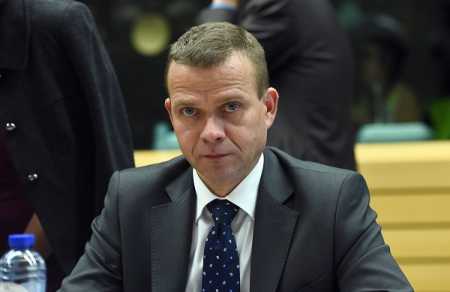|
Wed, 23 Sep, 2015 01:17:19 AM Finland to take 2400 refugees in next 2 years FTimes Report, Sep 23  Finland's Interior Minister Petteri Orpo attends an extraordinary Justice and Home Affairs council at the European Council on migrants in Brussels, on Tuesday September 22, 2015. Photo AFP-LEHTIKUVA. Finland has abstained from voting on transfers of refugees at the meeting of European Union interior ministers held in Brussels on Tuesday as the government believes that the transfer should be on a voluntary basis.
The interior ministers of the EU member states decided to relocate 120,000 asylum seekers from Greece and Italy to other EU countries, said an official press release.
Finland has decided to take about 2,400 asylum seekers over the next two years.
“I am pleased that we reached agreement on relocating the 120,000 asylum seekers. We did not, however, reach agreement without voting. Finland abstained because, in our view, burden sharing issues should not be decided by qualified majority but they should be agreed on a voluntary basis,” said Interior Minister Petteri Orpo, who represented Finland at the meeting.
The vote was held because four eastern European countries opposed transfers. Finland was the only country that abstained
“In spite of how we voted, Finland will fulfil its responsibility, as we have said from the very beginning. In addition, we still need joint EU action to ensure that Italy and Greece register those entering their countries.”
“At present, people are not registered in all EU countries. This results in uncontrolled migration of asylum seekers across Europe with asylum seekers even turning to human smugglers. It is, however, positive that the hotspot approach facilitating registration is being set up in Italy and Greece,” Orpo added.
Transfers of asylum seekers were granted, as the majority of member states supported the vote.
It was decided at the meeting that asylum seekers will not be relocated from Hungary to other EU countries, as previously proposed by the Commission. The proposed 54,000 people to be relocated from Hungary will be relocated from Greece and Italy instead.
On 9 September, 2015, the European Commission put forward its package of proposals for a better management of migration flows while promoting solidarity and burden sharing within the Union. The home affairs ministers will continue the follow-up of the agreed measures at their meetings this autumn.
The EU heads of state or government will convene tomorrow to discuss the refugee situation. Prime Minister Juha Sipilä will represent Finland at the meeting.
Meanwhile, the Interior minister Petteri Orpo held a meeting of Nordic ministers responsible for migration and asylum affairs in Brussels where they discussed the asylum situation in the Nordic countries.
Orpo expressed Finland's concern about the number of unregistered asylum seekers travelling through Denmark and Sweden to Northern Finland, according to a press release of the Ministry of the Interior.
“It is not acceptable that people who have entered the EU illegally travel from one country to another without being registered as asylum seekers,” Orpo emphasised.
The Nordic ministers called for joint efforts by the Nordic countries to take action in the countries of origin of refugees.
Such action includes supporting the activities of the UN High Commissioner for Refugees (UNHCR), participating in the relocation of quota refugees, and trying to find legal routes to enter Europe.
The Nordic ministers jointly stated that the Dublin system is not currently working because asylum seekers are not registered when they enter the EU territory.
According to the Dublin procedure, the EU Member States first entered by asylum seekers are responsible for their registration.
As Greece and Italy are facing unprecedented pressures, they have not registered those who have arrived in the country but let them leave the country without registration, the release mentioned.
“The Dublin system is the cornerstone of the common European asylum system. If it does not work, the Schengen system to guarantee the free movement of people will not work either,” it said.
Orpo underlined the need for both bilateral and multilateral cooperation between the Nordic countries, and of working together at EU level.
More News
|
|
Finland Times
| Tuesday, 27 January, 2026 |

